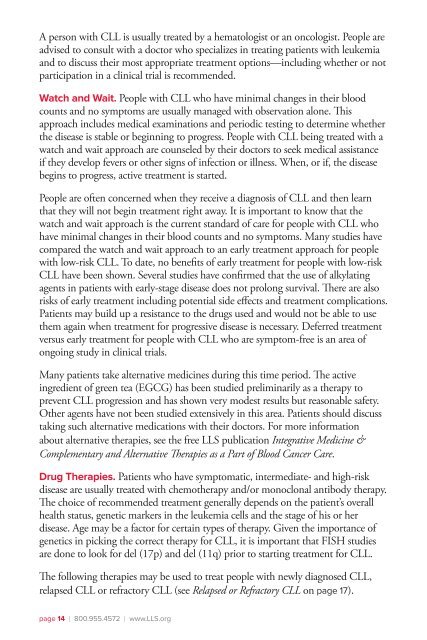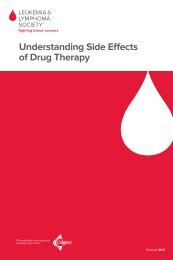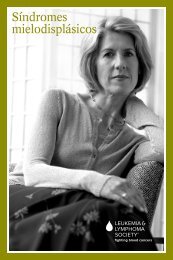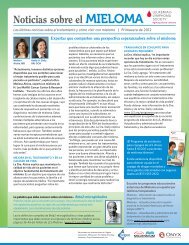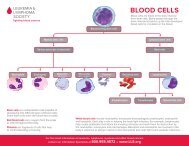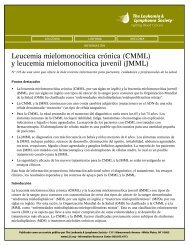Chronic Lymphocytic Leukemia - The Leukemia & Lymphoma Society
Chronic Lymphocytic Leukemia - The Leukemia & Lymphoma Society
Chronic Lymphocytic Leukemia - The Leukemia & Lymphoma Society
You also want an ePaper? Increase the reach of your titles
YUMPU automatically turns print PDFs into web optimized ePapers that Google loves.
A person with CLL is usually treated by a hematologist or an oncologist. People are<br />
advised to consult with a doctor who specializes in treating patients with leukemia<br />
and to discuss their most appropriate treatment options—including whether or not<br />
participation in a clinical trial is recommended.<br />
Watch and Wait. People with CLL who have minimal changes in their blood<br />
counts and no symptoms are usually managed with observation alone. This<br />
approach includes medical examinations and periodic testing to determine whether<br />
the disease is stable or beginning to progress. People with CLL being treated with a<br />
watch and wait approach are counseled by their doctors to seek medical assistance<br />
if they develop fevers or other signs of infection or illness. When, or if, the disease<br />
begins to progress, active treatment is started.<br />
People are often concerned when they receive a diagnosis of CLL and then learn<br />
that they will not begin treatment right away. It is important to know that the<br />
watch and wait approach is the current standard of care for people with CLL who<br />
have minimal changes in their blood counts and no symptoms. Many studies have<br />
compared the watch and wait approach to an early treatment approach for people<br />
with low-risk CLL. To date, no benefits of early treatment for people with low-risk<br />
CLL have been shown. Several studies have confirmed that the use of alkylating<br />
agents in patients with early-stage disease does not prolong survival. <strong>The</strong>re are also<br />
risks of early treatment including potential side effects and treatment complications.<br />
Patients may build up a resistance to the drugs used and would not be able to use<br />
them again when treatment for progressive disease is necessary. Deferred treatment<br />
versus early treatment for people with CLL who are symptom-free is an area of<br />
ongoing study in clinical trials.<br />
Many patients take alternative medicines during this time period. <strong>The</strong> active<br />
ingredient of green tea (EGCG) has been studied preliminarily as a therapy to<br />
prevent CLL progression and has shown very modest results but reasonable safety.<br />
Other agents have not been studied extensively in this area. Patients should discuss<br />
taking such alternative medications with their doctors. For more information<br />
about alternative therapies, see the free LLS publication Integrative Medicine &<br />
Complementary and Alternative <strong>The</strong>rapies as a Part of Blood Cancer Care.<br />
Drug <strong>The</strong>rapies. Patients who have symptomatic, intermediate- and high-risk<br />
disease are usually treated with chemotherapy and/or monoclonal antibody therapy.<br />
<strong>The</strong> choice of recommended treatment generally depends on the patient’s overall<br />
health status, genetic markers in the leukemia cells and the stage of his or her<br />
disease. Age may be a factor for certain types of therapy. Given the importance of<br />
genetics in picking the correct therapy for CLL, it is important that FISH studies<br />
are done to look for del (17p) and del (11q) prior to starting treatment for CLL.<br />
<strong>The</strong> following therapies may be used to treat people with newly diagnosed CLL,<br />
relapsed CLL or refractory CLL (see Relapsed or Refractory CLL on page 17).<br />
page 14 I 800.955.4572 I www.LLS.org


